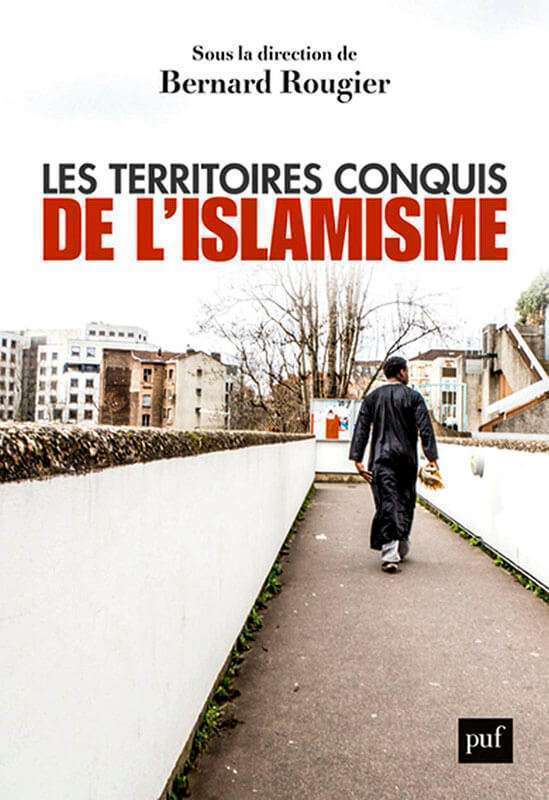The Islamist conquest of European Islam

This collective work documents the phenomenon of Islamism in France, but it contains lessons for other Western countries. Its editor, sociologist Bernard Rougier, is professor of Arab Civilisation and Culture at the New Sorbonne University (Paris 3) and disciple of the prominent political scientist Gilles Kepel. Like Kepel, Rougier questions common explanations for the radicalisation of Muslims in the West, such as failed integration policies, socioeconomic circumstances, and psychological factors. While acknowledging the influence of these variables, both experts convincingly link that radicalisation to the Islamist-Salafist drift experienced by Muslim countries since the 1970s1.
Contributors to this work include academics but also several of Rougier’s students, young men and women of North African or sub-Saharan descent who grew up in the conflictive neighbourhoods in which they conducted their research: the town of Toulouse, several communes in the Paris region, and the Brussels municipality of Molenbeek. This allowed them to access mosques, associations and shops without raising suspicions, and they give first-hand testimony of the Islamists’ hostility to the West, their determination to create a parallel Muslim society, and their double discourse, which changes depending on their public and superficially condemns Jihadi terrorism while at the same time shoring up the narrative that justifies it. In addition, the work includes chapters on events in Saudi Arabia and Yemen that shed light on the evolution of Islamism in Europe.

The title is an echo of ‘Les territoires perdus de la République’, another collective work published in 2002 in which a group of teachers denounced the anti-Semitism, sexism and conspiracy theories they faced in schools in the greater Paris area, especially from youngsters of North African origin. At the time its authors – most of whom wrote under a pseudonym to avoid retaliation – were branded racist and Islamophobic. The social climate has changed, as shown by the fact that an updated edition of ‘Les territoires perdus de la République’ was published in 2015 and by the very different reception accorded to ‘Les territoires conquis’ de l’islamisme. In the meantime, France has suffered multiple terrorist attacks that left hundreds dead.
Rougier starts off by distinguishing the four main forces of Islamism in France and other Western countries. The oldest are the Tabligh movement and the Muslim Brotherhood. The first emerged in the Indian subcontinent in the 19th century with the aim of preserving Muslim identity from the influence of the Hindu majority, and it prioritises preaching among Muslims to exhort them to return to the Islam of the prophet. The Muslim Brotherhood appeared in the Middle East and have often clashed with regimes in the region, but in the West they pragmatically cooperate with governments and organisations, especially on the left of the political spectrum, which has allowed them to become the representatives of institutionalised Islam2. Salafists burst onto the scene in the 1990s, when Saudi Arabia decided to promote them as an alternative to the Muslim Brotherhood, whom it had come to consider a threat, and they share many traits with Saudi Wahhabism. Finally, Jihadis are inspired by Islamist and Salafist texts but resort to violence to put them into practice.
The four forces compete locally, often aggressively: The Salafists accuse the Tablighis of ignorance, and the Muslim Brothers, of being too lax, and they are in turn attacked by the Jihadis for not taking their beliefs to their logical conclusions. And strictly speaking, Islamism refers to the ideology of the Muslim Brotherhood and similar organisations3. However, what unites them would justify their inclusion under the common classification of “Islamist”: they all promote a communitarian vision of Muslims as a group exclusively defined by their religious identity. They all share the notion of Islam as a creed that guides all aspects of life4. And they all use the “us against them” discourse to encourage the segregation of Muslims from the rest of society, rejected as decadent, immoral, and Islamophobic.
The accusation of Islamophobia is a weapon against anyone who dares criticise not only Islam, but this fundamentalist, totalitarian and xenophobic interpretation of it. It is also used against Muslims critical of Islamism, denounced as “lost” and even “traitors.” Unfortunately, Islamists have become the dominant voice of Islam in the West by virtue of their organisational capacity, foreign funding, and the complicity of Western institutions and politicians, whether by ignorance or by electoral opportunism. Such is the case in the Parisian commune of Aubervilliers, where the communist party responded to the loss of its social base due to deindustrialisation and to the settlement of migrant populations by establishing ties with local Islamists. The latter guarantee it votes in exchange for access to patronage networks that legitimise their aspirations to represent the Muslim community and reinforce their control over it.

‘Les territories conquis...’ reveals the “Islamist ecosystems” that have emerged in neighbourhoods afflicted by poverty, marginality and unemployment. Those ecosystems include mosques, religious bookstores5, halal businesses (from butchers to clothing stores and marriage agencies), and sports and leisure associations, which present the opportunity to reach the young. And it exposes the link between Jihadism and criminality: the recruiter persuades petty criminals that they are not responsible for their actions but victims of the infidel society, and offers them the possibility of redeeming themselves without abandoning their activities, which become a source of terrorist financing. Crime is even justified, because drug-dealing, theft and fraud weaken the enemies of Islam.
Anyone with some background knowledge of the Middle East can see the similarities between what is happening in France or Belgium and what has happened in Muslim-majority countries such as Egypt, Iran or Algeria. Some of the tactics are different: in the West, Islamists abuse freedom of expression and defend the veil in the name an individual freedom; in Muslim countries they advocate the criminalisation of apostasy and blasphemy and seek to impose on women the dress code they consider Islamic. Those supporting them are the ultraconservative political forces that promoted Islamism in Muslim societies as an alternative to left-wing ideologies, and do the same among Muslim communities elsewhere in order to avoid their secularisation, which could be contagious. As Rougier and his fellow researchers remind us, the first “conquest” was that of Islamism over Islam.
1 Kepel documented this phenomenon in his doctoral thesis, written after years of research in Egypt and published in 1984 under the title Le Prophète et Pharaon. English translations appeared in the UK as The Prophet and Pharaoh and in the US as Muslim Extremism in Egypt.
2 One of the chapters in the book describes how the discourse of the Muslim Brotherhood in the West has evolved to embrace the postmodern theories so fashionable in the academic world and within Leftish circles, adopting concepts such as intersectionality.
3 In fact, certain countries that promote Salafism (e.g. Saudi Arabia) or tolerate it (e.g. Egypt, Syria) ban and persecute Islamism because it constitutes a threat to the status quo.
4 Islam is “a comprehensive doctrine and creed. It is not satisfied unless it controls society and guides every dimension of life, from entering the toilet to the construction of the state and the establishment of the caliphate,” in the words of Yusuf al-Qaradawi, an Egyptian-born Qatari sheikh considered the Muslim Brotherhood’s main ideologue. See Ana Belén Soage, “Sheikh Yūsuf al ‐ Qaradawi: A Moderate Voice from the Muslim World?”, Religion Compass 4/9 (2010), pp. 26-40. 564, 572 (note 8). The reference to the toilet room comes from a hadith (oral tradition) according to which prophet Mohammad entered it with his left foot and left it with his right foot.
5 The book includes a study on literature about Islam which reveals a progressive “Salafisation” of the publications accompanied by a significant improvement in presentation (e.g. hard covers, high-quality paper, use of colours…). This improvement is not reflected in the price of the publications, which would indicate that they are being subsidised.








